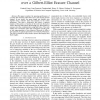Free Online Productivity Tools
i2Speak
i2Symbol
i2OCR
iTex2Img
iWeb2Print
iWeb2Shot
i2Type
iPdf2Split
iPdf2Merge
i2Bopomofo
i2Arabic
i2Style
i2Image
i2PDF
iLatex2Rtf
Sci2ools
103
click to vote
CORR
2010
Springer
2010
Springer
On the Queueing Behavior of Random Codes over a Gilbert-Elliot Erasure Channel
This paper considers the queueing performance of a system that transmits coded data over a time-varying erasure channel. In our model, the queue length and channel state together form a Markov chain that depends on the system parameters. This gives a framework that allows a rigorous analysis of the queue as a function of the code rate. Most prior work in this area either ignores block-length (e.g., fluid models) or assumes error-free communication using finite codes. This work enables one to determine when such assumptions provide good, or bad, approximations of true behavior. Moreover, it offers a new approach to optimize parameters and evaluate performance. This can be valuable for delay-sensitive systems that employ short block lengths.
| Added | 01 Mar 2011 |
| Updated | 01 Mar 2011 |
| Type | Journal |
| Year | 2010 |
| Where | CORR |
| Authors | Parimal Parag, Jean-François Chamberland, Henry D. Pfister, Krishna R. Narayanan |
Comments (0)

